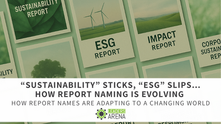Will 2020 be the year when ESG goes mainstream?
- Feb 17, 2020
- 4 min read
SASB & TCFD backers leave no room for companies to hide.
By Andrew Bond, Heather Keough and Miguel Santisteve at Leaders Arena
The start of 2020 points at an acceleration in the pace of change on ESG becoming the new business as usual. Since December, we have seen a swathe of climate related commitments from companies and investors. Just on climate alone, for example, Repsol[1] and BP[2] have recently made commitments to reduce their carbon emissions to net-zero by 2050, an unimaginable ambition in the energy sector only a year ago. Microsoft went beyond that, committing to become carbon negative by 2030.[3] At the same time, the largest passive investors, often criticized for not being vocal enough on sustainability issues within their portfolios, also stepped up their ESG efforts.
Will 2020 be the year when ESG finally goes mainstream?

ESG Equity Market nears $6tn
Leaders Arena’s research shows that during 2019 the global ESG equity market continued to grow at a significant rate. By our calculations, which focus on measuring the true assets which fully integrate ESG criteria in investment decisions, the ESG equity market now stands at almost $6tn, having grown by 28% during the year. However, the growth rate slowed down relative to the overall equity market, reaching 14% of all shares held by institutional investors globally. This is reflective of the fact that most of the equity growth was driven by index trackers (the big three: Blackrock, Vanguard and State Street) which are less advanced in their ESG integration processes than some of their active management counterparts.
While historically, the U.S. has trailed its global peers in its integration of ESG, in 2019 that changed with U.S. asset managers having led the growth in ESG equity assets, measured as a percentage of a country’s total equity assets under management. ESG integration in equity investing slightly increased and now stands at 6%.
For more details, please click here to access our latest 2019 Year-End ESG Equity Market Monitor.
World's largest managers' ESG push
While BlackRock’s CEO recent letters to CEOs[4] and its clients[5] are still reverberating in boardrooms, hundreds of large listed companies are coming to terms with the idea of meeting Larry Finks’ new set of expectations on ESG. Companies that until now were not necessarily considering the Sustainability Accounting Standards Board (SASB) and the Task Force on Climate-related Financial Disclosures (TCFD) reporting frameworks as part of their ESG disclosures, are now in a rush to understand what they mean and how to implement them.
BlackRock surprised the markets earlier on in the year, by announcing that it was joining the Climate Action 100+ initiative, the highly influential engagement platform that targets companies that generate the largest environmental impacts. These developments follow a year in which BlackRock was repeatedly criticized for its proxy voting record on climate-related resolutions.
Slightly ahead in scoring company efforts, State Street Global Advisors has been engaging with companies on ESG and found that around 75% of companies they evaluated lacked a meaningful consideration of ESG in their strategies and reporting. In January, it announced that it will make its voice heard in this upcoming proxy voting season.[6]
BlackRock and State Street’s 2020 commitments to hold companies to higher ESG standards bodes well for the long-term health of the market. Based on these announcements and the continued active ownership of hundreds of ESG-minded investors we would expect engagement with companies to increase during this year and beyond.
SASB/TCFD: Will 2020 bring consensus on ESG reporting standards for companies?
Higher transparency expectations apply to both investors and companies. The United Nations Principles of Responsible Investment (PRI) has incorporated into its signatory reporting requirement indicators aligned with the TCFD disclosures. During 2020, the 2,400+ signatories of the PRI will be mandated to report using this framework thereby having a ripple effect on companies. Over 1,000 companies with a combined market cap of £12tn have committed to reporting to the TCFD framework.[7]
Meanwhile, SASB has continued to expand its global influence. According to our recent research, investors asking companies to report on SASB manage $15tn in equity assets, owning on average 37% of shares in listed companies globally.[8] While originally developed for use in the US, SASB’s influence is growing on a global scale. Investors include Norges Bank Investment Management, UBS Asset Management, Legal and General Investment Management and Schroders Investment Management in addition to BlackRock and State Street Global Advisors.
There is little surprise therefore in seeing the senior management and boards of major companies awakening to this new reality. Peers are moving fast, and it is time to act or face inevitable investor backlash. Companies’ ESG communications specialists can support management efforts by keeping up to date with the growing set of expectations, benchmarking peer efforts and increasing communication with ESG investors to provide strategic direction.
SASB and TCFD are powerful tools with which to evaluate your own sustainability factors and to improve the quality of your reporting to investors. At Leaders Arena we help companies to seize this opportunity. You can get in touch with us for a free initial consultation at: support@leadersarena.global.
Notes:
[1] https://www.repsol.com/en/press-room/press-releases/2019/repsol-will-be-a-net-zero-emissions-company-by-2050.cshtml
[2] https://www.bp.com/en/global/corporate/news-and-insights/press-releases/bernard-looney-announces-new-ambition-for-bp.html





















